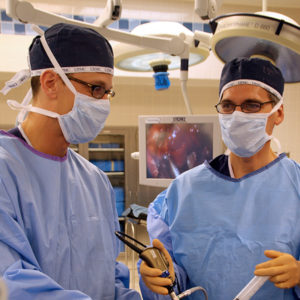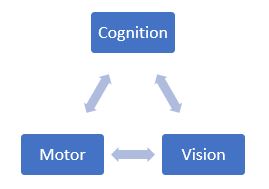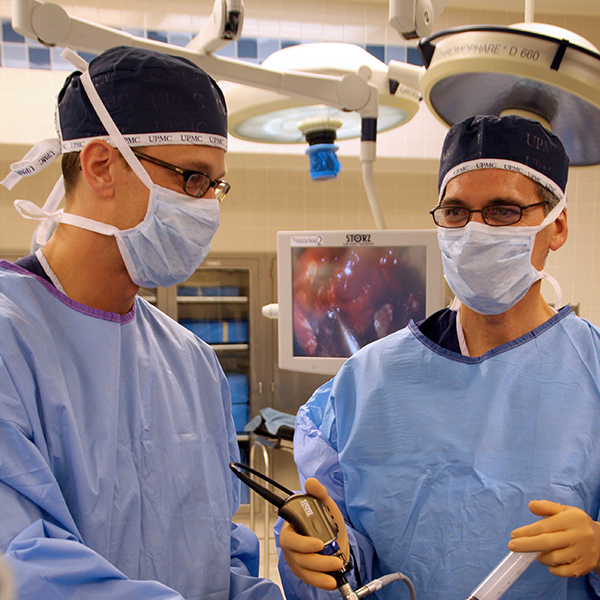
There is much more to surgery than manual dexterity. A virtuoso violinist does not necessarily make a great surgeon. The Surgical Cognition Laboratory at the Eye & Ear Institute is a new initiative that delves deep into the surgical experience to better understand the origins of surgical expertise. Led by Carl Snyderman, MD, MBA of the Department of Otolaryngology at the University of Pittsburgh, the program intends to recognize and integrate new technologies to improve patient outcomes and healthcare experiences. According to Dr. Snyderman, “We now have the tools to understand the learning process for minimally invasive endoscopic techniques and develop more effective training methods.”
The latest generation of surgeons
Minimally invasive surgery, in particular endoscopic surgery, requires a unique set of skills as surgeons learn to operate while viewing a video screen. Sometimes this is even done remotely using robotic technology. The road to proficiency is long and arduous- it takes many years of practice to become an expert surgeon. The latest generation of surgeons was raised on video games. There is evidence that prior gaming experience better prepares surgeons for endoscopic surgery. Beyond that, little is known about what makes a good surgeon.
What is Surgical Cognition?
Cognition is defined as “the mental action or process of acquiring knowledge and understanding through thought, experience, and the senses.” Surgical cognition can be understood as a triangle of interconnected attributes: motor skills, visual perception, and cognition. Dr. Snyderman and team are embarking on a series of studies to enhance their knowledge about each of these areas so that we may better understand the acquisition of surgical skills and develop more effective methods of training.

How video-surveillance technology and AI will help
The Surgical Cognition Lab will partner with a private hospital system in northeastern Indiana to measure the skills of surgeons performing laparoscopic abdominal surgery. Using video-surveillance technology and deep machine learning (artificial intelligence), the team will work with computer scientists to analyze surgical videos and rate surgical performance. This will allow us to screen surgeons, identifying those in need of additional training or those with declining performance. The insights we gain from this will be applicable to all types of endoscopic surgery.
Can we alter the visual environment to improve surgical performance?
Just as there are individuals that are color blind, some people lack stereopsis, the ability to see with depth perception. Other aspects of visual perception may also vary across surgeons. How does this affect performance?
- One project involves tracking eye movements during surgery using special glasses to capture what surgeons are looking at during different stages of an operation. Are there differences based on level of training and experience? Can we train surgeons more effectively by emulating the visual patterns of expert surgeons?
Are surgical skills the result of nature or nurture?
In other words, are the attributes of master surgeons with them since birth or developed as a result of training?
- Snyderman and the team are currently conducting a study that uses brain-training games to determine which brain skills (memory, attention, speed of processing, flexibility, problem-solving) are most strongly associated with surgical performance. In this study, medical students will perform a series of surgical tasks in a simulation training center. Their “surgical performance” will be compared to their level of performance on various brain games that measure the attributes noted above. The results of this study may allow us to predict those individuals best suited for a surgical career and identify deterrents to the acquisition of surgical skills.
- Phase 2 of this study will apply training with brain games to see if surgical performance can be enhanced.
The Surgical Cognition Laboratory is a unique center that has the potential to revolutionize the training of surgeons. It is anticipated that the results of the investigations will have a direct impact on the quality of surgery and advance the capabilities of minimally invasive surgery.
To learn more about our research activities and how you can help us achieve our goals, please contact Heather Chronis Danek at heather@eyeandear.org.
For the latest news on surgical cognition, subscribe to EEF’s Monthly Newsletter. To support Dr. Snyderman’s groundbreaking research, make a donation to The Eye & Ear Foundation.
